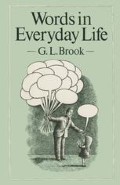Abstract
It is not always easy to distinguish between dialects and other varieties of English, such as slang and register. The essential difference between a dialect and a register is that the former is used habitually by a group of people, while the latter depends on the occasion when it is used, formal or informal, for business or for pleasure. The difficulty in distinguishing between the two varieties arises because a group may be either permanent or temporary. If a number of doctors get together to discuss a patient’s condition, they are likely to use a lot of technical terms. Are they using their occupational dialect or a register? If the sort of language that they employ is that used by doctors on all occasions, it is an occupational dialect; if it is used only on certain occasions, it is best regarded as a register.
Access this chapter
Tax calculation will be finalised at checkout
Purchases are for personal use only
Preview
Unable to display preview. Download preview PDF.
Notes and References
E. M. Wright, Rustic Speech and Folk-lore (OUP, 1914) p. 6.
See map on p. 37 of G. L. Brook, English Dialects (Andre Deutsch, 1963).
Peter Wright, The Language of British Industry (Macmillan, 1974) pp. 140 f.
See Sir William A. Craigie, Northern Words in Modem English, (SPE Tract No. 50, OUP, 1937).
Logan Pearsall Smith, Words and Idioms (Constable, 1925) p. 161.
Richard Hoggart, in the Foreword to Kenneth Hudson’s The Dictionary of Diseased English (Macmillan, 1977) p. vii.
Kenneth Hudson, The Dictionary of Diseased English (Macmillan, 1977) p. xxvii.
Henry Bradley, The Making of English, revised by Simeon Potter (Macmillan, 1968) pp. 72 f.
T. H. Savory, The Language of Science (Andre Deutsch, 1953) pp. 52 f.
Edmund Sandars, An Insect Book for the Pocket (OUP, 1946) p. 8.
E. G. Boulenger, World Natural History (Batsford, 1937) p. 67.
Elizabeth Mary Wright, Rustic Speech and Folk-Lore (OUP, 1914) p. 7.
Philip Howard, New Words for Old (Hamish Hamilton, 1977) p. 60.
Mario Pei, The Story of English (Allen and Unwin, 1953) p. 224.
Sean Jennett, The Making of Books (Faber, 1951) p. 48.
David Crystal and Derek Davy, Investigating English Style (Longman, 1969) p. 208.
P. G. Osborn, A Concise Law Dictionary (Sweet and Maxwell, fifth edition, 1964) p. 119. I am indebted to Mr Stuart Harling Ll B for this reference.
Lord Strang, The Diplomatic Career (Andre Deutsch, 1962) p. 64. Quoted from
Kenneth Hudson, The Language of Modem Politics (Macmillan, 1978) pp. 78–9.
Philip Howard, Weasel Words (Hamish Hamilton, 1978) p. 13.
Author information
Authors and Affiliations
Copyright information
© 1981 G. L. Brook
About this chapter
Cite this chapter
Brook, G.L. (1981). Dialect and Slang. In: Words in Everyday Life. Palgrave Macmillan, London. https://doi.org/10.1007/978-1-349-06817-3_4
Download citation
DOI: https://doi.org/10.1007/978-1-349-06817-3_4
Publisher Name: Palgrave Macmillan, London
Print ISBN: 978-0-333-35276-2
Online ISBN: 978-1-349-06817-3
eBook Packages: Palgrave Social & Cultural Studies CollectionSocial Sciences (R0)

